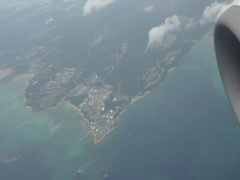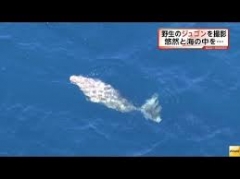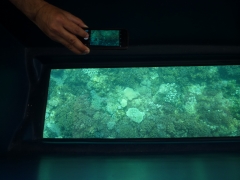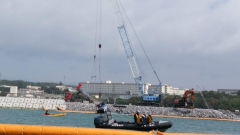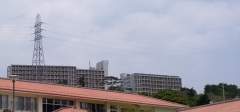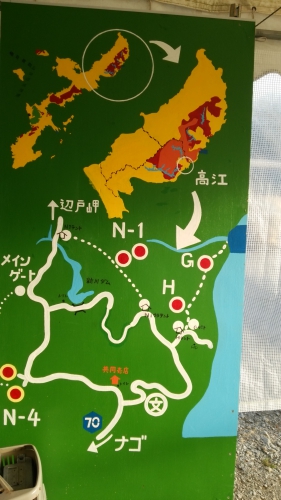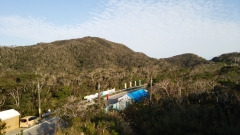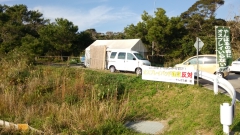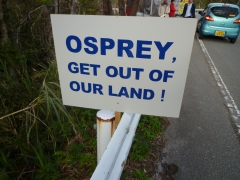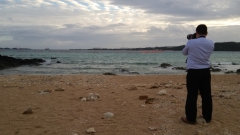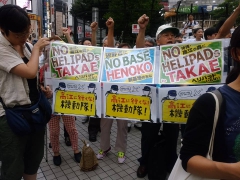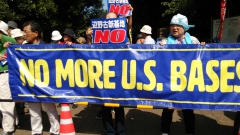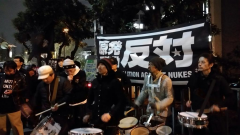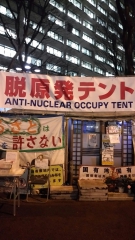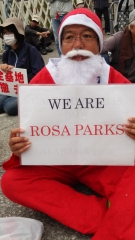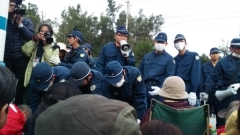21 June 2018
Dear US Ambassador to Japan, regarding Okinawa issue
I sent a letter to US Ambassador to Japan, Mr. Bill Hagerty today. It should be handed to him next Monday hopelly.
The below is what I wrote to him.
Dear Mr. Ambassador Hagerty,
June 24, 2018
My name is MASAGATA, a Japanese man living in Tokyo. I used to study at San Francisco State University, where I majored in International Relations. I am now working as a translator using the English knowledge I acquired in the US.
I am writing this letter to tell you about a matter that is very important to both of our nations. I am sure that you are well aware of many issues between the two nations. I would like to mention the most important of these: a matter that might result in long-term deterioration of the current healthy relationship between the two nations. I urge your government to rethink its ways of dealing with this issue. Four years ago, I wrote to former Ambassador Caroline Kennedy regarding the same issue. This is modified version of the letter with update information.
The matter in question is the relocation of the US Marine Base from Futenma in Ginowan City, Okinawa Prefecture, Japan’s southernmost tropical islands, which are a little like Hawaii. In 1996 both the American and Japanese governments agreed to relocate Futenma base to Camp Schwab to get away from the densely populated area around Futenma. Camp Schwab is on the coastline of the island, in an area called Henoko.
I am sure you have already been there and talked with Okinawa governor, Mr. Onaga about this issue. As you may know, there has been a local resistance movement since the relocation plan was announced. Locals near Camp Schwab are concerned about the deterioration of their living environment. Many environmental activists also oppose the plan because of the abundance of forms of wildlife that are unique to the area around Camp Schwab. The relocation plan includes reclamation of the sea to build two runways expanding existing facility. Schwab is located in between Henoko coast (left) and Oura Bay (right).
This photo is of a dugong, an endangered marine mammal that eats grasses in the sea. It is just ridiculous that the nation that protests Japan’s whaling in the Antarctic Sea – and even dolphin hunting in Taiji, Wakayama Prefecture that former Ambassador Kennedy was eager to protest – is helping to threaten another marine mammals that live in Japan.
In Oura Bay, the world’s largest, oldest and northernmost blue coral lives and has continued to grow for 3000 years.
Many new species are discovered in the bay recently. A lot more may be still undiscovered.
On Henoko coast, the sea is enclosed and scheduled to be reclaimed in August and dugongs and other creatures’ lives would be threatened. Dugongs’ sea grass is found in the reclaiming area. They will lose their feeding place. As for blue coral, reclaimed space would change the sea current and might adversely affect life of the coral. Then what will happen is that your nation will be accused of helping to diminish such wonderful and rare creatures for the interests of the few.
The few, you might know, are certain businesses and government people who want some gains from the project. One of major contractors of the project is Taisei Kensetsu Corporation, where son of current Cabinet Secretary, Mr Suga, works. Actually, the Japanese Ministry of Defense carried out an environmental assessment in which it was claimed that there were no dugongs in the sea. But the environmental organizations such as WWF and The Nature Conservation Society of Japan claim that the MoD’s assessment was wrong and the organizations’ own research found clear traces confirming the existence of dugongs. Recently, Okinawa’s local newspaper revealed the news that the MoD was aware of the finding but had covered it up.
On November 22nd, 2013, in Nago City (to which Camp Schwab is attached), the city council made a resolution demanding the Okinawa Governor not to permit landfilling of the sea. However, the governor permitted the landfill in December even though a majority of Okinawans disapproved his decision.
The following month, in January, Okinawa Prefectural Council made a resolution demanding the Governor’s resignation. Okinawan protest activists announced legal action against the prefectural government in order to cancel the permit. Later, on January 19th, the mayor of Nago City, INAMINE Susumu was re-elected because of public support for his policy of the city’s refusing corporation with central and US governments regarding construction of the new base project.
However, last February INAMINE lost to a candidate Mr. Toguchi who was backed up by the Japanese government’s ruling parties. But Mr. Toguchi never mentioned whether he agree the relocation plan or not during the election campaign, rather he claimed that he request the US Marines move out of Okinawa. So he could not be seen as pro-relocation and construction of new base in Henoko from voters’ perspective although he is betraying the voters’ expectation now.
You might say this issue is something to be handled by the Japanese government, and that it is not the responsibility of the US military. But that sounds very hypocritical. The US military is the one that uses the facility and up until now involved in designing of new runways and annexed facilities. The US government can cancel that project and find another relocation site outside Okinawa. If the US continues to attribute this to the Japanese government, it is just like what Japanese conservative politicians say when it comes to the “Comfort Women” issue: “The Japanese Imperial Army was not responsible for kidnapping women in Asia for sexual slavery for soldiers during the war period in the early 20th century, it was what outsourced local brothels did.” The US Congress disavowed such argument and made a resolution to demand that the Japanese government apologize for former comfort women in 2007.
Until now, tens of protestant were arrested and injured by police at the gate or coast of Camp Schwab. Such news reports have been broadcast all over Japan. The construction will take many years to complete, while resentment is continuing to build. Your military and diplomats are dealing with such problems for a very long time. Young marines trained there as well. During mayoral election, I met group of young marines in Nago city. I talked to them but they said they were not allowed to talk with strangers.
Besides these factors, there are technical issues revealing infeasibility of the construction project as follows.
- Active faults are found to exit down below planned construction site of runways. If that is the case in California, the project wouldn’t be permitted.
- Around planned construction site of runways are buildings higher than US military aviation standard, flying there might cause collision with these buildings, similar situation to Futenma Air Base in Ginowan city. The buildings include school and its dormitory at which young students attend classes or reside. The school officials were not informed of this matter until recently. No plan of relocation is announced although a power transmission tower next to the building was already planned to relocate from that site.
- Geological survey conducted in the sea indicates seabed is too fragile to reclaim like mayonnaise, which consumes more budget and time so the construction period should be much longer than expected like 15 years from now.
It is possible that the project is cancelled halfway for some reason but irreversible damages would be left together with grudge from locals.
In fact, the US military presence in Okinawa and even nationwide is becoming nothing but troublesome. More of us know that the US military presence no longer functions as defense or deterrence like in the Cold War era. China is said to be a new threat but we know that US-China relations have become more vital for your nation since China owns more US treasury bonds and buys more US goods than Japan does. China has become a larger economy than Japan these days. Trade amount between US and China is three times more than that between US and Japan. President Trump’s family has businesses in China. Unlike former Presidents, Mr. Trump never mentioned human rights issues in China.
Mr. Trump imposed sanctioned on China for trade issue recently but Japan is a prime target as well since Japan has run surplus on trade with US like Canada and Europe. Mr. Trump’s sanction tells how important and influential China has been for US economy.
We can easily predict that the US would not help Japan even if China and Japan became involved in a dispute for some reason such as the territorial right to the Senkaku islands. The US cannot send troops to assist Japan fighting against the Chinese military because such action might cause great losses for your national interests. China has many ways to sanction your nation as already did recently. China also played a big role in negotiating with North Korea. China is vital for US politics as well as economy.
Military experts say that the biggest reason that the US military forces stay in Japan is to cut cost of their own because Japan provides host nation support fund, which we call “Sympathy Budget” that accounts for more than 70% of total expense for the US bases in Japan. There are more than 130 facilities of US military in Japan. Most of the troops are stationed at 30 facilities in Okinawa prefecture that accounts for 1 % of total of Japan’s territory and population. Okinawa has been occupied until 1972, which is 20 years after mainland Japan regained sovereignty and was the only place that experienced ground battles within Japan, causing 200,000 civilian casualties during WW II. During Vietnam War, it was a transit point to transport soldiers, military weapons and equipment. Now there is no strategic importance. How many of US congressmen and senators knows Okinawa? Is this place worth keeping bases in?
Deploying your military so much in our country, especially Okinawa is just causing growing distrust against your country. I believe the Okinawa issue presents the perfect timing for your nation to rethink its military deployment in Japan in order to improve the relationship between the two nations. Constructing a base on reclaimed land in the Henoko sea is the worst possible idea.
US military presence functions to apply American influence on our nation. Yes, it did work that way but you really have to know this may be working negatively. The image of your country itself is no longer positive like in the past. In other words, the US is no longer a powerful land of dreams, nor is it any longer a role model for us. One example of this can be seen in a recent best-selling book on your country’s poverty issue. The title of the book is “Rupo Hinkontaikoku America” (Report, Poverty Superpower, America). It was written by a Japanese journalist, TSUTSUMI Mika. The book describes how Americans are struggling with poverty in a plutonomy society and explains how Japan should not follow suit.
We know that a lot of young Marine troops stationed there come from poor families that cannot afford college education and have problems like domestic violence. They join the Marines by system, so called, Poverty Draft. That is why they cause troubles with Okinawa locals.
The interesting thing to note is that Japan was democratized and the wealth of the nation was redistributed from pre-war plutonomy by the US occupying forces. Thanks to them, Japan has become the most egalitarian society among industrialized nations. We do appreciate that. We are always good friends to you as long as you are what you should be. However, recently I, myself turned a former friend due to what is happening in Okinawa.
When Okinawa was first occupied by US Army which defeated Japanese Imperial Army, Okinawans saw Americans arrived there as liberators but later that was found to be false. But this time is a greatest chance to be the one since the Japanese government is too rigid to hear voice of Okinawa. Please do not miss this chance.
As for practical solutions, I recommend your organization to review a proposal by a private think tank, The New Diplomacy Initiatives (http://www.nd-initiative.org/en/), which suggests removal of US Marine bases from Okinawa but instead, establishing joint Humanitarian Assistance/Disaster Relief (HA/DR) Corp. with Japan’s Self-Defense Force equipped with high speed transport vessels, which rotates around East Asia. It is cost-effective and able to contribute to security of the region.
Sincerely,
23:28 Posted in Ecology, Japan News, Politics, Travel, US-Japan relationship | Permalink | Comments (0) | Tags: military, okinawa, environmentalism
29 July 2016
US Marine helipad construction drives precious forest and human destruction, We'll "Try Everything" to stop that!
It is happening in Takae district, Higashi Village, Okinawa Island Prefecture, southernmost tropical region in JAPAN. The population of the prefecture is about 1.4 million. 3 hour flight from Tokyo. Kind of remote from main 4 islands of Japan. It is like Hawaii in U.S.
In exchange for return of some portion of US Marine training area indicated in dark red, they demanded building 6 new helipads in the forest near Takae district (circled area), residence of 150 people. The locals have been fighting against the construction project for years. They set tents at gates of construction sites as barricades.
If the new helipad construction is completed, their residential area would be surrounded by helipads of ospreys that cause bigger noise and more frequent accident occurance than helicoptors because of defects of the structure.
Helipads for ospreys are bigger than helicopters and destroy bigger areas of the forest. The forest is where endangered birds such as Yanbarukuina and Noguchigera inhabit. Not just forest destruction but big noise and heat waves can potentially threaten their lives. The heat waves ospreys release burn grasses on the ground.
2 of 6 helipads N4 were completed already and have been used even though the agreement states new ones would be used after all of them are completed. Then what happened is noise level of Takae district rapidly increased, tens of times more than before. 11 year-old boy got sick and had to evacuate from his local community.
Okinawa had been occupied by US military force between 1945, end of Pacific War and 1972. During Vietnam war, Takae residents were used as VetCon target in the simulation training by the military. Agent Orange may have been sprayed there.
Even after return to Japan, US military bases have remained based on US-Japan defense treaty, agreements between two soreveign nations. In 1996, US and Japanese governments agreed to return some areas of the bases to former land owners and Okinawan communities. But return plans come with relocation plans. Even the military occupied areas is shrunk, the base function gets bigger by providing new bases. Other case is Henoko-Oura bay sea located seaside of Camp Schwab landfill project for the relocation of Futenma base. A beautiful coral sea, where endangered specie, marine mammal dugongs inhabit. This issue have been discussed many time on this blog. Please check articles in Okinawa tag. This article is a good description of the issue.
These plans have been met with local protest. Majority of locals dissapprove the plans. Governor of Okinawa Prefecture, Onaga and mayors of Nago city, where Camp Schwab is located, majority of Okinawa prefectural assembly members and all elected members of Japan's parliament from Okinawa constituencies express objection to the landfilling and new base construction plan. As for Takae, last week the construction work resumed, Okinawa assembly made a resolution that the construction should be halted.
Okinawans are fighting against US military and Japanese government that follows its demands.
Last week Japanese government dispatched hundreds of police officers from mainland to suppress local protestants that kept on sit-in at the gate of N1 construction site. Their sit-in protest was once dissolved and their tents and cars as barricades were taken away forcibly but the protest still continued.
Civil activists from all over Japan, and around the globe are backing this. Even in Tokyo, protest activities are going on. Mainstream media reported these events and more people learnt what is going on. Sorry, Americans, more Japanese hate your country.
I want to give this song to protestors including myself. "Try Everything" to stop that! The forest is in fact zootopia. There may be monsters like PokeMon! They will "Try Everything" to stop destruction of their world.
00:43 Posted in Ecology, Japan News, Music, Politics, USA issues | Permalink | Comments (3) | Tags: okinawa, military, human rights
30 April 2016
5 Years On from Fukushima-Daiichi, 30 Years On from Chernobyl
March and April were the big months for anti-nuclear movement of this year. 5th anniversary of Fukushima Daichi nuke plant's accident and 30th anniversary of Chernobyl nuke accident.
Since 5 years ago, Japanese public opinion has turned out to be mostly anti-nuke generation. Before that, survey results are usually pro-nuke generation.
Since that time, terms such as sievert, becquerel, caesium, iodine, plutonium, strontium, thyroid cancer, china syndrome, and etc have become very familiar. Not just with experts but ordinary citizens.
Fukushima Prefecture still suffer from radioactive released from the crippled plants.
I went there last month. I saw the radioactive-level measurement machine in front of railway station located 45 km away from the plant. Neighboring area of Evacuation zone.
That level is double the normal level before the accident. Radioactive still remains.
It is reported that tens of times of higher percentage of thyroid cancer cases are found among minors in Fukushima. That level is similar to Chernobyl which was estimated to release 10 times more radioactives to the environment.
Currently only two plants out of 50 in Kagoshima Prefecture are being operated. Last month two plants in Fukui Prefecture were shut down due to the court order after citizens filed lawsuit against the power company.
In Tokyo, on 5th anniversary day, citizens gathered at prime minister's residence to show their protest.
In a corner of a ministry building which is in charge of nuclear energy administration, protestants set up occupy tents to show their will since September 2011. It was modeled after Occupy Wall Street movement.
Kan Naoto who was a prime minister at that time interviewed by Asahi Newspaper recently claimed there was a possibility that whole Tokyo area would have become evacuation zone. It was a kind of miracle that it did not go so terrible. It may be attributed to God (or Buddha).
I remember that 5 years ago, I was working and emailing with a client who said the job we were dealing could be worthless because we never knew how our society would have become.
In Chernobyl another centuries are needed to completely dismantled the crippled plant. Thousands years to recover the area to get back to normal zone. As Einstein claimed, humanity and nuclear can never coexist.
Renewable energy has been booming lately. In next decades price of renewable energy will be much lower than nuclear energy.
Nuclear age is coming to end. We must end it!
Not just that, we must change our lifestyle so that we do not need so much energy that we have to rely on such hazardous energy source.
02:19 Posted in Ecology, Japan News, Politics, Science, Society, Tokyo Life | Permalink | Comments (0) | Tags: nuclear power, fukushima
23 January 2016
Being Rosa Parks at US Marine Camp Schwab in Okinawa
From last December to beginning of this month, I was in Okinawa to join protest activities of locals who are opposed to construction of new military base runways in US Marine Camp Schwab in Nago city, Okinawa.
Why we are opposed has been described in this blog for years. Please read the posts clicking the tag Okinawa.
Especially, this article gives you outline of what is going on there. My letter to US Ambassador to Japan, Caroline Kennedy, daughter of JFK.
While I joined the protest, I used picket board that says "We are Rosa Parks."
Rosa Parks as you may know, is the symbol of refusal to unjust matters. A Black woman who refused to give front seat to white passengers in a bus and was arrested in Montgomery, Alabama, 1955. But her action sparked bus boycott protest led by Dr. Martin Luther King. 9 years later, civil rights Act was passed. A year after that, Dr. King led peaceful march from Selma to Montgomery to call for enactment of voting rights bill. Black people in the Southern states were blocked at voting registration office.
What surprised me was marines reaction to the picket board. Young marines looked positive. I asked one security guard, who was a young white man inside the camp premise, if he knew what it meant. He said smilingly "I know what it means." One Black man driving a car looked at me, smiled and gestured his support. "Rosa Parks" is known to every American.
I saw the movie, "SELMA" after I got back home in Tokyo. It was a great movie. I found how hard it was for him to do this. A lot of people were hurt and even killed. But he and his followers never gave in.
Interesting thing to know was Dr. King was a very smart man so that he once retreated the march to avoid bloodshed by local police. He filed lawsuit against the Alabama state that bans peaceful march. Then the court made an order to allow the march. He prevailed.
Just like Rosa Parks and Dr. King. we did peaceful protest at the gate of Camp Schwab. Sit-in-protest at the gate that construction vehicles passed through.
Police came and took us from the gate. We never foughtback but just kept sitting down on the ground. I was carried by the police from shoulders to toes.
Protestants do every day. It has been going on for years. There were several injuries and arrests. But we still keep doing this. We cannot stop the construction but at least we are delaying that. We will never give in.
While I joined in the sit-in protest, I really felt like Rosa Parks, Dr. King and their followers in their times. We may be backed up by their souls.
Thank you, Dr. King and Ms. Rosa Parks. I am proud of being part of this protest activity.
The US government should hear the voice of protestants and halt such stupid construction project. It is as stupid as segregation laws. It is actually what is happening in your own yard.
15:28 Posted in Ecology, Film, Japan News, Politics, Society, US-Japan relationship, USA issues | Permalink | Comments (0) | Tags: history, military, okinawa, racism, afro-american







